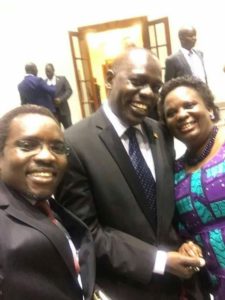
ENTEBBE. President Museveni has directed the military to resfrain from manhandling MPs.
The President’s orders come in the wake of reports that MPs and other opinion leaders opposed to the manner in which the Amuru sugar project is being handled have been attacked by the security forces.
Museveni said what happened in Amuru was uncalled for adding that MPs should be handled with care and not be made to lie down or be beaten during arrest.
Aruu South MP, Odonga Otto was grabbed and treated roughly during his arrest at a protest against the Amuru land giveaway to Madhvani Group of Companies.
The President was meeting leaders from Acholi sub-region led by the Paramount Chief, Rwot Onen David Acana II at State House Entebbe this morning.
Wednesday’s meeting follows the nude protest by a group of elderly women before Lands minister Betty Amongi in Kololo, Amuria District last Thursday.
The bare-chested women were protesting what was seen as a forceful land survey and unwanted presence of the military in their area.
President Museveni called for a peaceful solution to the land controversy involving the Amuru Sugar Works project currently ongoing in Amuru district.
He warned that there should be no violence and no Ugandan should be intimidated as they seek a peaceful end to the land issue in Kololo.
Odonga Otto requested President Museveni to borrow a leaf from Atiak Sugar Works, where outgrowers possess the greater percentage of the land under sugarcane in the project.
As such, Odonga said, it would be better if 5,000 out of the 10,000 hectares to be given to Madhavani in Kololo, Amuru is set aside for outgrowers.
But in his response, the President said that the Amuru sugar works model is different from the one in Atiak hence the idea is not applicable.
The MP also appealed to President Museveni not to let Amuru Sugar Works be a regime project that will crumble the moment he leaves office. He said it should be a long lasting project for Ugandans.
He warned that if the project is not generally acceptable by the community, the sugarcane plantation might end up being burnt.
To this, Museveni said he is doing whatever he is doing in the interest of the country and will not get tired of supporting investors.
He said the government’s involvement in the project is informed by the sugar scarcity in the country. He said the government will conduct a security audit on any cases of intimidation or casualties suffered by locals as result of mistreatment by the security forces.
Over the last few days, residents in the contested area have reported being beaten and forced off their land by soldiers, police and crime preventers, some have also been arrested.
Lawyers for the community, Judith Oroma and Okello Oryem, said there is no legal implication of going ahead with the survey of the land.
The lawyers contend that the land survey document and the Memorandum of Understanding betweenh the litigants, land owners and the government shall be tabled before court by the Attorney General as part of the deed while they seek to revoke the decision of High Court sitting in Gulu, 2012 which ruled that the land is public land.
Under Uganda’s Constitution and the Land Act, 1998, there are four types of land tenure systems recognised: mailo, freehold, leasehold and customary. ‘Public land’ as a system of tenure as insinuated in the 2012 Gulu High Court ruling does not apply.
Kitgum Municipality MP Beatrice Anywar urged Lands minister Betty Amongi to go slow while handling the issue of land at Kololo.
Sources privy to the State House meeting said Patrick Okumu and Juma Lanek, who represented the land owners, testified before President.
Museveni how they were allegedly beaten up by those who don’t want them to give up their land for investment.
But Kilak North MP Anthony Akol denied the allegation, saying the people who the land owners claim beat them are already in police detention.
A team of cultural, religious and political leaders will on Monday head to Kololo on a confidence building mission, especially to reassure the people who were intimidated by the presence of the military in their villages.




